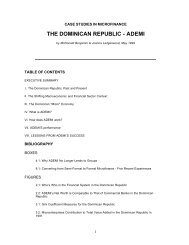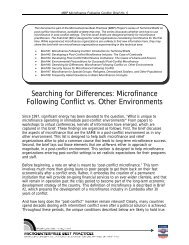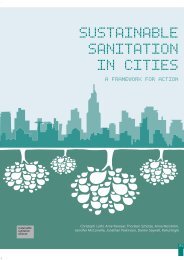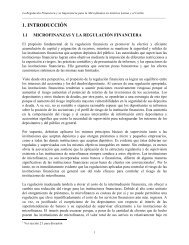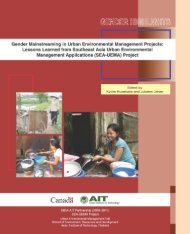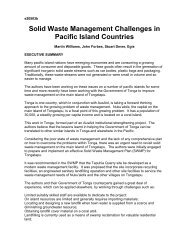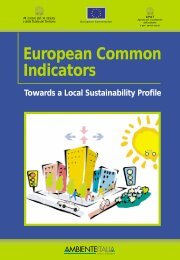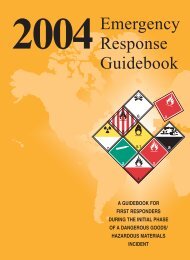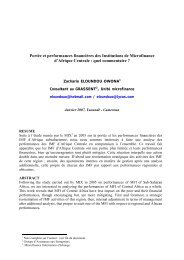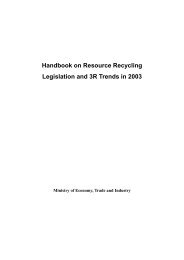The International Implementation Scheme (IIS) - Unesco
The International Implementation Scheme (IIS) - Unesco
The International Implementation Scheme (IIS) - Unesco
You also want an ePaper? Increase the reach of your titles
YUMPU automatically turns print PDFs into web optimized ePapers that Google loves.
DESD <strong>International</strong> <strong>Implementation</strong> <strong>Scheme</strong> (<strong>IIS</strong>)<br />
ESD mirrors the concern for education of high quality, demonstrating characteristics: such<br />
as:<br />
• Interdisciplinary and holistic: learning for sustainable development embedded in the whole<br />
curriculum, not as a separate subject;<br />
• Values-driven: sharing the values and principles underpinning sustainable development;<br />
• Critical thinking and problem solving: leading to confidence in addressing the dilemmas and<br />
challenges of sustainable development;<br />
• Multi-method: word, art, drama, debate, experience, … different pedagogies for modelling<br />
processes;<br />
• Participatory decision-making: learners participate in decisions on how they are to learn;<br />
• Applicability: learning experiences are integrated in day to day personal and professional life;<br />
• Locally relevant: addressing local as well as global issues, and using the language(s) which<br />
learners most commonly use.<br />
ESD will be shaped by a range of perspectives from all fields of human development and<br />
including all the acute challenges the world faces. ESD cannot afford to ignore their<br />
implications for a more just and more sustainable process of change. <strong>The</strong> plan notes the<br />
important perspectives provided by: human rights, peace and human security, gender equality,<br />
cultural diversity and intercultural understanding, health, HIV/AIDS, governance, natural<br />
resources, climate change, rural development, sustainable urbanisation, disaster prevention and<br />
mitigation, poverty reduction, corporate responsibility and accountability, and the market<br />
economy.<br />
ESD is for everyone, at whatever stage of life they are. It takes place, therefore, within a<br />
perspective of lifelong learning, engaging all possible learning spaces, formal, nonformal<br />
and informal, from early childhood to adult life. ESD calls for a re-orientation of<br />
educational approaches – curriculum and content, pedagogy and examinations. Spaces for<br />
learning include non-formal learning, community-based organisations and local civil society, the<br />
workplace, formal education, technical and vocational training, teacher training, higher education<br />
educational inspectorates, policy-making bodies, …and beyond.<br />
It is true to say that everyone is a stakeholder in education for sustainable development.<br />
All of us will feel the impact of its relative success or failure, and all of us affect the impact of<br />
ESD by our behaviour, which may be supportive or undermining. Complementary roles and<br />
responsibilities devolve to a number of bodies and groups at different levels: local (sub-national),<br />
national, regional and international. At each level, stakeholders may be part of government (or<br />
intergovernmental at regional and international levels), civil society and non-governmental<br />
organisations, or in the private sector. <strong>The</strong> media and advertising agencies will support broad<br />
public awareness. In addition, indigenous peoples have a particular role, having an intimate<br />
knowledge of the sustained use of their environments, and being particularly vulnerable to<br />
unsustainable development.<br />
Seven interlinked strategies are proposed for the Decade: advocacy and vision building;<br />
consultation and ownership; partnership and networks; capacity building and training;<br />
research and innovation; information and communication technologies; monitoring and<br />
evaluation. Together they form a coherent approach to the incremental increase over the<br />
Decade of the promotion and implementation of ESD. <strong>The</strong>y will ensure that change in public<br />
attitudes and educational approaches keep pace with the evolving challenges of sustainable<br />
development.<br />
DESD implementation will depend on the strength of stakeholder commitment and<br />
cooperation at local (sub-national), national, regional and international levels. Networks<br />
and alliances will be the crucial element, forging a common agenda in relevant forums. A small<br />
6<br />
2005



